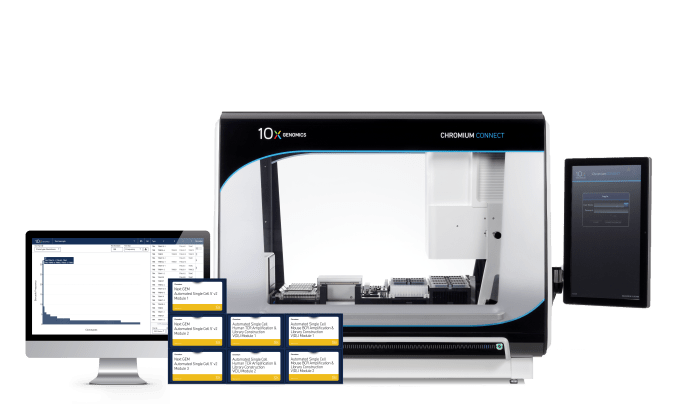Boosting your immune profiling insights with automation
Our quest to resolve the complexity of the immune system and its orchestration of the immunological response to infections, cancer, and other pathologies is a challenge that our lives depend on. Single cell RNA-sequencing technologies are driving important advances in our understanding of innate and adaptive immunity. However, scaling single cell approaches can stretch laboratory resources, and the increase in sample processing can be time-consuming and labor-intensive. At a time when staggered laboratory shifts and shortages feel like the new normal, speed and precision are more important than ever. Additionally, the need for consistency and reproducibility across multiple experiments, users, and sites is critical to maintain longitudinal or global studies.
The solution? Automation.
With Chromium Connect, an automated instrument for single cell library preparation, you can maximize your precious resources, going from cells to sequencing-ready libraries with walk-away convenience. Scale up your projects while shortening hands-on time, reducing human error, and increasing laboratory efficiency. Now you can confidently and efficiently leverage automated single cell workflows to generate consistent and reproducible results across experiments and across users.

In a recent webinar, 10x-perts Ella Chang, PhD, and Darisha Jhutty discussed the advantages of automation and introduced the new Single Cell Immune Profiling workflows that are expected to be available for Chromium Connect in early 2021. With both 5’ gene expression and V(D)J amplification workflows for Chromium Connect, you can examine the cellular heterogeneity of the immune system and T- and B-cell receptor diversity to discover new cell types, identify rare cell populations, and reveal clonal expansion in response to disease and therapeutic intervention. Obtain paired, full-length receptor sequences from T cells and/or B cells with complete isotype resolution, and scale up TCR and antibody discovery projects. During the webinar, Darisha Jhutty outlined the workflows and how they can help you make the most of your time in the lab, while Dr. Chang shared some early data using 5’ gene expression and V(D)J amplification workflows.
Our presenters also participated in a live Q&A, answering viewer questions about automation, the new Single Cell Immune Profiling workflows for Chromium Connect, and how you can accelerate your investigation of the immune system.
Watch the full, on-demand webinar now, or keep reading to see some of the highlights from the Q&A.
Saving Time with Chromium Connect
How much hands-on time does it take to set up an automated run?
Normally, it takes about 45 minutes to set up Chromium Connect. Sample preparation, however, depends on the type of sample you’re working with. When we prepare PBMCs in house, it generally takes 30 to 45 minutes to prepare them, but other sample types will require more time. For example, if your sample requires flow sorting, that takes additional time upfront.
How long does a complete automated 5’ immune profiling run take?
If you run the entire Automated Single Cell Immune Profiling workflow, including both 5’ gene expression and V(D)J amplification, you can finish the complete run in two days. However, we find it useful to schedule runs so that during downtime, our scientists can use that time to work on other tasks.
Our cells are usually ready late in the day. Can the instrument run unattended overnight?
Yes, definitely. We often leave our in-house Chromium Connect instruments to run overnight as there are features enabled for safe pausing points that store samples at safe temperatures until you return the next day.
Exploring Immunity with Automated Single Cell Immune Profiling
Did you also run or plan on running expression data using tumor samples other than melanoma?
We currently have a plan to run melanoma samples, but we are also considering running other clinically relevant samples. Especially when it comes to V(D)J, it’s important for researchers in the cancer field to understand cancer immunology, so we are always open to suggestions from cancer researchers about what we should incorporate into our experiments.
What does batch to batch variation look like?
To examine the performance of Single Cell Immune Profiling on Chromium Connect using the 5’ V(D)J amplification workflow, human TCR and BCR sequences were amplified from the same input cDNA using the Chromium Connect automated workflow and the manual workflow with two users. We observed high reproducibility and consistency between samples, runs, and instruments for Single Cell Immune Profiling data generated on Chromium Connect.
How does sensitivity of the automated workflow compare to that of the manual assay?
We observed similar sensitivity for both TCRɑ and TCRβ with Chromium Connect compared to the manual workflow. We found that the automated workflow also demonstrated comparable TCR library complexity to the manual workflow, and a similar fraction of cells with productive VJ spanning pairs.
For more insights into the new Automated Single Cell Immune Profiling workflow and capabilities, watch the full introductory webinar on-demand.
Explore more resources for Chromium Connect and Automated Single Cell Immune Profiling.

